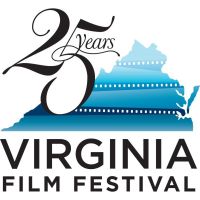 The 2012 Virginia Film Festival has begun its 25th year. Sean McCord speaks with Jody Kielbasa, the festival’s director, about what to expect this year.
The 2012 Virginia Film Festival has begun its 25th year. Sean McCord speaks with Jody Kielbasa, the festival’s director, about what to expect this year.
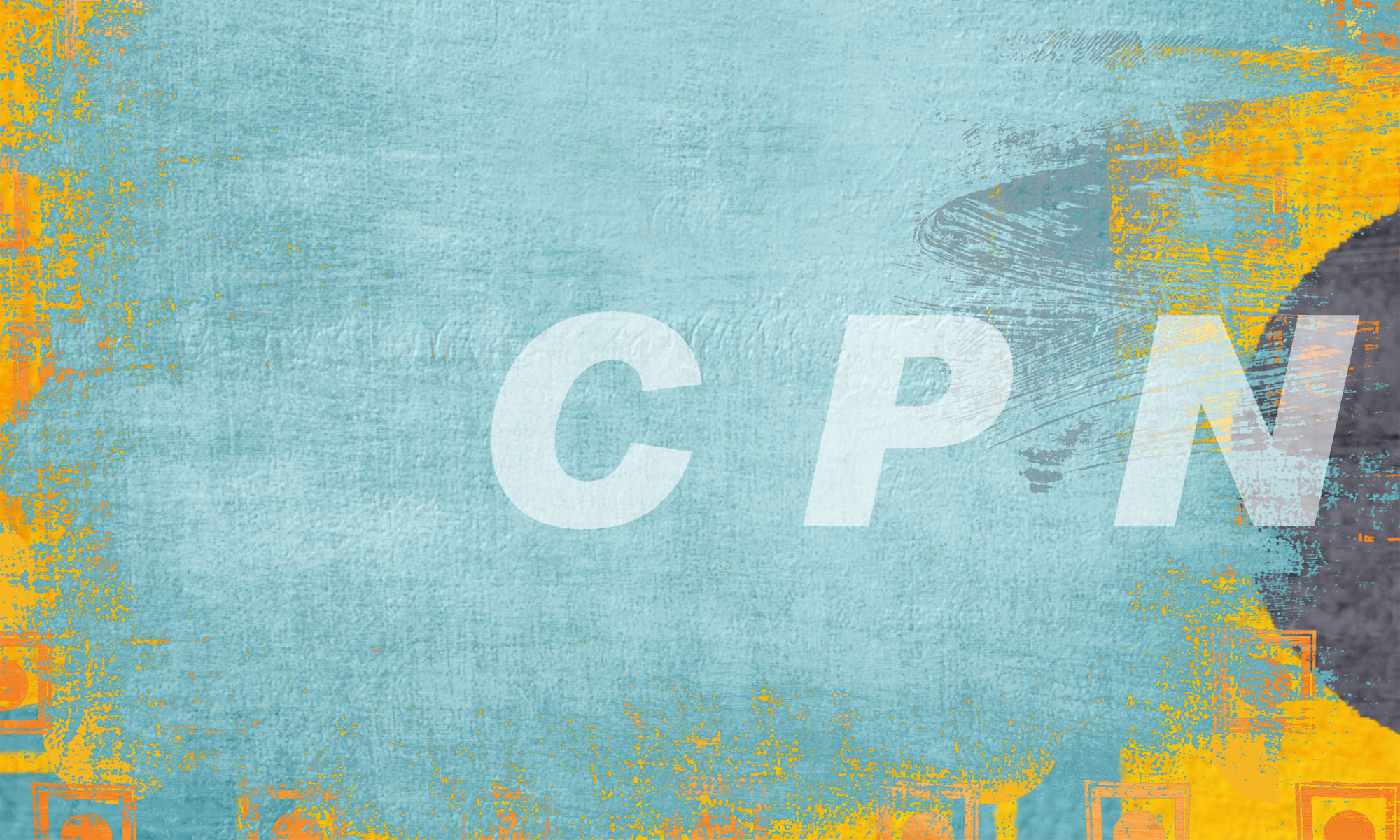
Charlottesville Podcasting Network
Lectures, radio shows and more available on-demand
 The 2012 Virginia Film Festival has begun its 25th year. Sean McCord speaks with Jody Kielbasa, the festival’s director, about what to expect this year.
The 2012 Virginia Film Festival has begun its 25th year. Sean McCord speaks with Jody Kielbasa, the festival’s director, about what to expect this year.

On Thursday, September 6, 2012, Beth Taylor presented the first lecture in a new series entitled “Virginia History 301: The Old Dominion in Antebellum Times.”
In this podcast, you will learn about how the practice of slavery became institutionalized in the American South. According to Taylor, field slaves worked 19 hour days sometimes in extreme temperatures. A slave’s working life could begin as early as age 6. By age 12, they were considered to be adults and assigned an adult’s work load. Taylor wraps up with the 1831 story of Nat Turner’s Rebellion, the bloodiest slave revolt in American history.
Ms. Taylor has served as director of interpretation at Jefferson’s Monticello and as director of education at James Madison’s Montpelier. She is also a fellow at the Virginia Foundation for the Humanities.
Taylor’s first book, A Slave in the White House: Paul Jennings and the Madisons was a New York Times best seller and a National Book Award nominee. She has appeared on The Daily Show, with Jon Stewart.
The series was organized by award-winning historian and Charlottesville-based author, lecturer, and cartographer Rick Britton in conjunction with the Senior Center in Charlottesville.
This is the first of a four part Thursday series. Click here listen all four parts of this series.
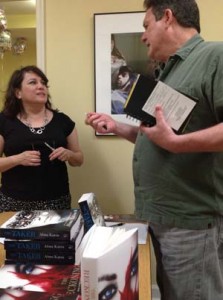 What happens when your novel doesn’t fit in one genre? What are the perils–and opportunities–of writing a book that defies categorization? Is there a marketplace for cross-genre books? On June 14, 2012, Alma Katsu, author of The Taker Trilogy (Gallery Books/Simon & Schuster), talked with mystery author Meredith Cole about fundamentals of storytelling, breaking the rules, and winning over readers of all stripes.
What happens when your novel doesn’t fit in one genre? What are the perils–and opportunities–of writing a book that defies categorization? Is there a marketplace for cross-genre books? On June 14, 2012, Alma Katsu, author of The Taker Trilogy (Gallery Books/Simon & Schuster), talked with mystery author Meredith Cole about fundamentals of storytelling, breaking the rules, and winning over readers of all stripes.
Alma Katsu is the author of The Taker and The Reckoning. The Taker was selected by the American Library Association/Booklist as one of the top ten debut novels of 2011, and translation rights have sold in a dozen languages. She is a graduate (MA) of the Johns Hopkins writing program and an alumna of the Squaw Valley Writers Conference.
On the October 28 Wake Up Call, substitute host Sean McCord fills in for Rick Moore to talk with Jody Kielbasa, festival director, and Wes Harris, festival associate programmer and production coordinator, about the annual Virginia Film Festival, including what the festival is about, the events going on during the festival, and more.
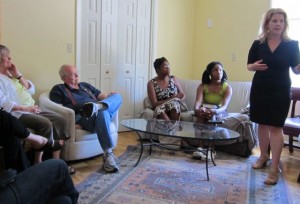 On Wednesday, June 13, 2012, playwright DeeDee Stewart and WriterHouse member Elizabeth Derby discussed Stewart’s journey from blog posts about her southern childhood to the international premiere of her one-woman show “Dirty Barbie and Other Girlhood Tales” at the Edinburgh Fringe Festival. She talked about the process of turning scenes from her life into a sold-out show.
On Wednesday, June 13, 2012, playwright DeeDee Stewart and WriterHouse member Elizabeth Derby discussed Stewart’s journey from blog posts about her southern childhood to the international premiere of her one-woman show “Dirty Barbie and Other Girlhood Tales” at the Edinburgh Fringe Festival. She talked about the process of turning scenes from her life into a sold-out show.
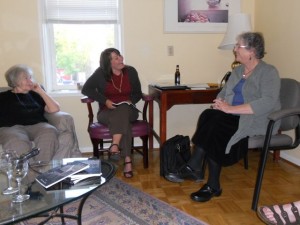 As part of WriterHouse’s celebration of National Poetry month, on Friday, April 20, 2012, 7pm, poet Melanie Moro-Huber read from her new book Axe in Hand (2012, New York Quarterly Books) and talked to fellow poet Roselyn Elliott about women in poetry.
As part of WriterHouse’s celebration of National Poetry month, on Friday, April 20, 2012, 7pm, poet Melanie Moro-Huber read from her new book Axe in Hand (2012, New York Quarterly Books) and talked to fellow poet Roselyn Elliott about women in poetry.
On the October 21 Wake-Up Call, host Rick Moore talks to Hawes Spencer, editor of The Hook, on several local important stories, including the EPA Superfund site in Greenwoood; a new book that challenges the idea of Thomas Jefferson as a benevolent slaveholder; and the 100th anniversary of The Jefferson Theater.
On the October 14 Wake Up Call host Rick Moore talks to Professor Dr. Manuel Lerdau of the UVa Department of Environmental Sciences and nutrition specialist and certified Wellcoach Wendy Vigdor-Hess about genetically modified foods, fact versus fiction on them, and any health risks or benefits.

New malls are springing up everywhere in both the City of Charlottesville and Albemarle County. Listen as Chris Engel and Mark Graham speak to the effect of these new developments on City and County planning.
Mr. Engel and Graham spoke at the Wednesday, October 10, 2012 meeting of the Senior Statesmen of Virginia. The meeting was held at the Senior Center in Charlottesville. Following the presentation, questions were taken from the audience. The program was moderated by SSV secretary Bill Davis.

Chris Engel, CEcD is the director of economic development for the City of Charlottesville. He has a bachelor’s degree in geography from Mary Washington College and a master’s degree in planning from Virginia Commonwealth University. He is also a graduate of the Economic Development Institute at the University of Oklahoma and is a member of the International Economic Development Council (IEDC) where he is a certified economic developer (CEcD). An active civic leader, his current leadership roles include: Chair of the Charlottesville Albemarle Convention and Visitors Bureau, and board positions with the Thomas Jefferson Partnership for Economic Development and Charlottesville Business Innovation Council. He has also been a Junior Achievement instructor and Comfort Zone Camp volunteer.
Chris has been instrumental in the development and implementation of Charlottesville’s economic development programs, including BusinessFirst, a personal-visit business retention program, the Shop Charlottesville initiative and the Charlottesville Technology Incubator. He was recently recognized with the 2010 CBIC Leadership Award for his work chairing the Tech Tour, an innovative workforce development initiative that connects students to career opportunities in the technology sector.
Prior to his current position in economic development, Chris worked for the Greater Richmond Chamber of Commerce and as a cartographer and GIS Analyst for private sector firms in Maryland and Pennsylvania.

Mark B. Graham, P.E., has been the Director of Community Development for Albemarle County since that department was created in 2004 and was instrumental in making it a “one stop shop” for all development permitting and oversight by the County. He brings a somewhat unique set of skills to this position having worked in both the private and public sector, combined with a back ground that includes both an MBA and almost thirty years as a licensed professional engineer. As the Director of Community Development, Mark has been directly involved with most of the large projects approved in the County since 2000, including: Hollymead Town Center, Stonefield (Albemarle Place), Avon / 5th Street (Wegmans), Biscuit Run, Cascadia, Rivanna Village, and many others.
Prior to working for Albemarle County, Mark worked in private industry as a professional engineer and managed development projects in Northern Virginia and Tennessee. His experience also includes working for Arlington County, Virginia as an environmental programs manager and the Texas Department of Highways (now Texas Department of Transportation) as a construction engineer. He has been registered as a Professional Engineer in Virginia since 1984.
Mark holds a B.S. in Civil Engineering from the University of Texas at Austin and a Masters of Business Administration from Virginia Tech.
On the October 7 Wake-Up Call, host Rick Moore talks with Robert Pianta, Dean of UVA’s Curry School of Education and Director of the Curry School’s Center for Advanced Study of Teaching and Learning (CASTL), an interdisciplinary center that provides evidence-based tools to improve teaching and strengthen learning.
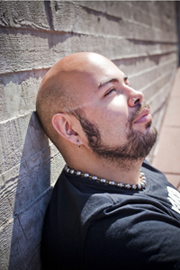 On March 10, 2012, playwright Enrique Urueta discussed his experience writing in the context of race and sexuality.
On March 10, 2012, playwright Enrique Urueta discussed his experience writing in the context of race and sexuality.
Enrique Urueta is a queer Colombian-American playwright from South Boston, VA whose award-winning plays Learn to Be Latina, The Danger of Bleeding Brown, and Forever Never Comes have been presented across the country.
On the September 30 Wake Up Call, host Rick Moore talks with Scott Harrop, lecturer of Middle Eastern Studies at UVA, about the recent uprisings and events occurring in the middle east, as well as what these actions imply, such as the state of free speech.